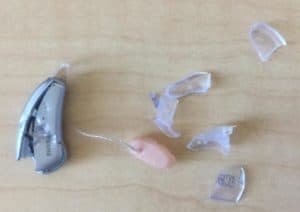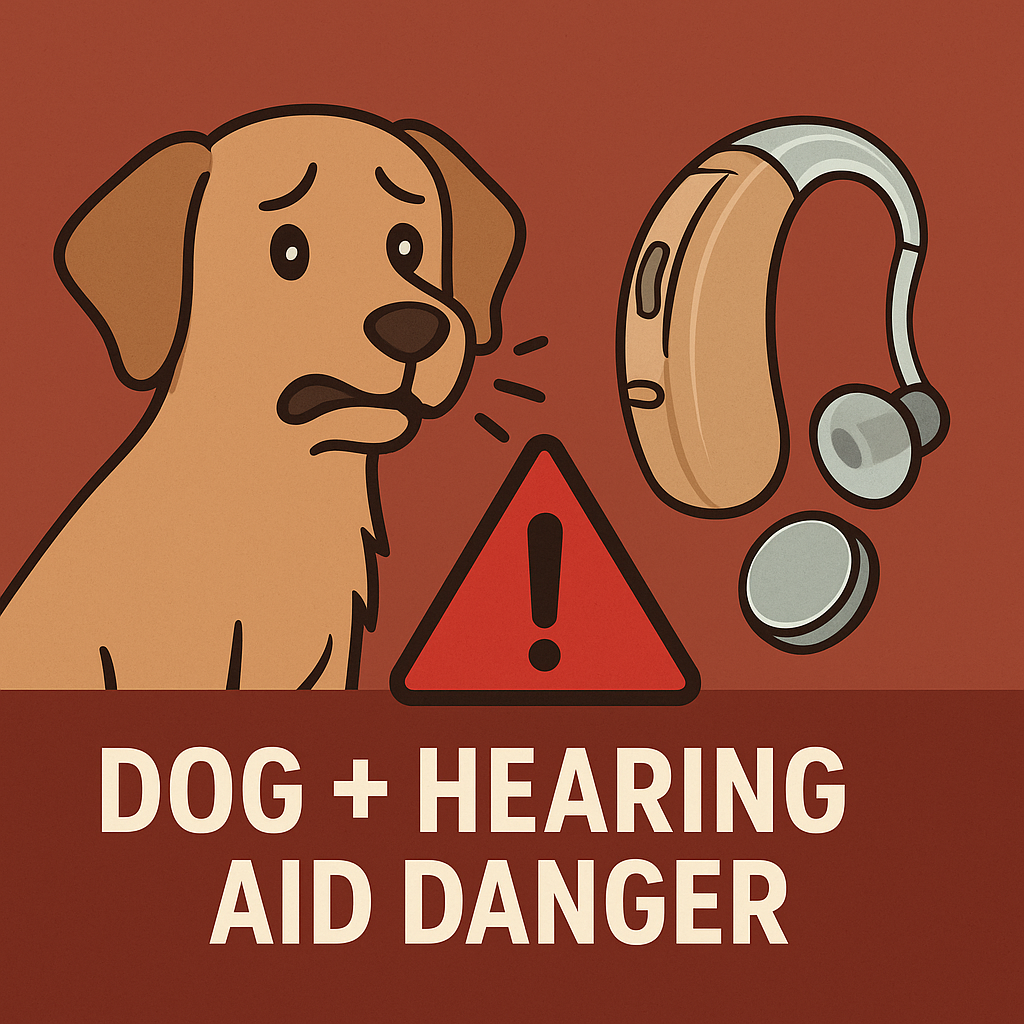As an audiologist, I hear about dogs chewing up hearing aids at least once a month. If your dog has gotten hold of your hearing aids, you are not alone — and time matters. The type of battery inside your device plays a huge role in whether your pet is at risk.
🔗 Learn what to do if your dog or pet swallowed a hearing aid battery.
The Dog May Have Swallowed the Hearing Aid Battery
There are three common types of hearing aid batteries. Quickly identifying which one your dog may have ingested will guide your next steps.
1. Disposable Zinc-Air Batteries
Zinc-air batteries are the most common disposable hearing aid batteries. You can recognize them by their small size and the removable sticker you peel off before use. They typically last 3–10 days in a hearing aid.
📌 Most modern zinc-air batteries are mercury-free (check for an “Hg 0%” or “Mercury Free” label). While these batteries are less corrosive than other types, ingestion still poses risks. In many cases, they may pass through the digestive tract without incident, but you should call your veterinarian or the Pet Poison Helpline (855-764-7661) to be safe.
Warning signs after zinc-air ingestion: loss of appetite, nausea, vomiting, very dark stools.
3. Lithium-Ion Rechargeable Batteries – Most Dangerous
🔴 If your dog chewed or swallowed a lithium-ion rechargeable battery — the type built into modern hearing aids with no removable battery door — this is an emergency. Lithium-ion batteries can cause chemical burns, internal bleeding, and death within hours.
Action Plan:
- Seek immediate veterinary care — do not wait.
- On the way to the vet, you can give your dog honey (if safe for your pet) to temporarily coat the battery and slow corrosion (Poison.org guidelines).
- Call the Pet Poison Helpline (855-764-7661) for real-time advice.
2. Silver-Zinc (ZPower) Rechargeable Batteries (less common)
Silver-zinc batteries are gold-topped, removable rechargeables that can be replaced with disposable zinc-air batteries. The manufacturer states they are non-toxic and non-flammable. Most pets will pass them without incident. Still, contact your vet for guidance and never attempt to reuse a battery after ingestion.
Symptoms of a Dog Eating a Hearing Aid
- Red, raw, or gray patches on the tongue
- Heavy drooling
- Vomiting
- Lethargy or unusual quietness
- Crying or whimpering
- Refusal to eat or slow chewing
- Very dark stools
Why Do Dogs Eat Hearing Aids?
Dogs love items that smell like you. After hours of wear, your hearing aids carry your scent, which can be irresistible to pets. In addition, if the device is still on after removal, it may emit a high-pitched whistle that attracts dogs to investigate — and chew.
How to Protect Hearing Aids from Dogs

Prevention is key:
- Store hearing aids in a secure dry-aid kit or dehumidifier case.
- Keep the case inside a drawer or cabinet.
- Turn off hearing aids before removing them.
If Your Hearing Aid Is Already Damaged
Gather all remaining pieces and take them to your audiologist. If under warranty, repairs may be free. If out of warranty, expect a repair fee (~$200) or a loss & damage replacement fee (~$200–$400). In some cases, you may need a new device — the silver lining is that modern models offer improved technology.
Storage Safety Tips
- Never store hearing aid batteries in the fridge.
- Keep batteries away from medications to avoid accidental ingestion.
- Pick up dropped batteries immediately — a magnetic wand can help locate them.
FAQs
Can a dog pass a hearing aid battery naturally?
Sometimes, especially with zinc-air or silver-zinc batteries, but you should always consult a vet to avoid complications.
Are lithium-ion hearing aid batteries dangerous for dogs?
Yes — they can cause fatal injuries within hours. Immediate veterinary care is essential.
What if my dog ate the whole hearing aid?
Even if the battery type is less dangerous, the plastic and metal parts can cause choking or blockages. Always seek veterinary advice.

